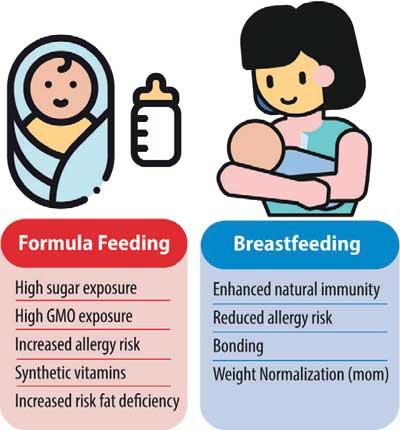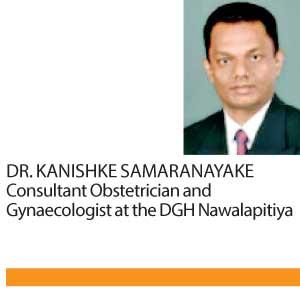13 Aug 2021 - {{hitsCtrl.values.hits}}

Breastfeeding is a crucial step to ensure that your baby gets all the nutrients that are much needed during its first few months of life. In discussion with the Health Capsule, Dr. Kanishke Samaranayake, Consultant Obstetrician and Gynaecologist at the DGH Nawalapitiya addresses the importance of breastfeeding and its benefits to both mother and child.
few months of life. In discussion with the Health Capsule, Dr. Kanishke Samaranayake, Consultant Obstetrician and Gynaecologist at the DGH Nawalapitiya addresses the importance of breastfeeding and its benefits to both mother and child.
Importance of breastfeeding
“Breastfeeding is conducted in the most effective way to ensure newborn health and nutrition. It provides all the energy and nutrients needed by the newborn in correct proportions in the first few months of life,” says Dr. Samaranayake.
Explaining the benefits to the newborn, he said that apart from nutritional value, breastfeeding also provides antibodies to protect from common childhood infections, ensures gut immunity and maturation and allows for bonding between the mother and baby. Hence, it is also superior in terms of hygiene and in the long term will help improve brain development, cardiac and dental health of the baby.
 Safety for young mothers and alternatives
Safety for young mothers and alternatives
Dr. Samaranayake explained that regardless of maternal age, breastfeeding is considered the superior form of nutrition for the newborn. However in order to ensure optimal maternal physical and mental health, it is better to provide support in terms of,
A. Providing additional caloric intake of 500kcal/day during the initial period of exclusive breastfeeding.
B. Continuous use of hematinics including calcium during 6 months postpartum.
C. Lactational education and advising on correct feeding techniques, positioning, breast milk increasing methods and proper breastfeeding habits by nursing or medical personnel trained in lactational management and care.
“Additional maternal benefits such as offering a natural mode of contraception, promoting uterine involution and long term reduction in risk of breast and ovarian carcinoma should be emphasized. Cost effectiveness of breastfeeding should also be highlighted” he added.
Explaining on the alternatives to breastfeeding, he said one can opt to giving formula and animal milk (eg-cow milk) though they are not considered as the best alternatives.
“Expressed breast milk feeding is a variant of breastfeeding in which breast milk is given expressed and collected in a cup. This feeding method is considered in special circumstances such as preterm newborn receiving incubator care or oropharyngeal anomalies, etc.
Giving IV fluids only is another option under special circumstances for babies in neonatal ICU or preterm baby unit. Adding that alternative breastfeeding methods are not effective as natural breastmilk, he said that except in special circumstances regarding neonate (extreme prematurity, anomalous babies) or mother (inadequate breast milk production, multiple gestations), breast milk is considered the primary and exclusive method of feeding for all newborns. It is superior in terms of benefits to both mother and baby.
unit. Adding that alternative breastfeeding methods are not effective as natural breastmilk, he said that except in special circumstances regarding neonate (extreme prematurity, anomalous babies) or mother (inadequate breast milk production, multiple gestations), breast milk is considered the primary and exclusive method of feeding for all newborns. It is superior in terms of benefits to both mother and baby.
“Alternative methods such as formula or animal milk carry risk of transmission of infections due to improper preparation techniques. Also proper nutritional benefit may not be given due to same reason. Animal milk also can cause enteritis due to allergic irritation of immature neonatal gut by proteins” he added.
Duration of breastfeeding
“According to WHO guidelines, exclusive breastfeeding will provide all the energy and nutrition necessary for the first 6 months of life. After introduction of solid foods, which is generally done around 6 months of life, breast milk will provide half of the nutritional needs up to one year; complementary food acting as supplementary. Up to two years of age when solid foods are the primary source of nutrition, breast-feeding will provide about additional 1/3 of nutritional requirement.
After 2 years of age, no significant benefit is shown by breastfeeding” says Dr. Samaranayake.
Dr. Samaranayake said that there was no significant difference in constituents and nutritional value, when comparing breast milk composition of mothers of different ages and health status.
However, he said that this is ensured only at the stake of maternal health and nutrition. “Therefore, it is advisable to provide additional support to such mothers in terms of diet, caloric addition, correcting any nutritional deficiencies and ensuring proper supplementation with vitamins and minerals, as well as providing adequate emotional and family support” he said.
Take home message
“All mothers should consider breastfeeding an essential and foremost component of caring for newborn. Unless in special circumstances, breastfeeding should be initiated within the first 30 minutes of life” Dr. Samaranayake explained.
Adding that alternate feeding meetups would be discouraged as potential risks outweigh the small benefits offered over breastfeeding, Dr. Samaranayake conclusively added that “breastfeeding is not a choice but a responsibility and is promoted for the benefit of both mother and child”.
19 Apr 2024 4 hours ago
18 Apr 2024 6 hours ago
18 Apr 2024 6 hours ago
18 Apr 2024 7 hours ago
18 Apr 2024 7 hours ago